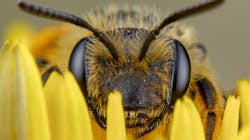Symposium Looks at Ways to Improve Pollinator Health
Healthy Hives 2020, a multi-year, $1.3 million research initiative of Bayer and Project Apis m. to improve honey bee health, today conducted a symposium at the annual American Beekeeping Federation (ABF) conference in Chicago.
The symposium, moderated by well-known pollinator researcher Dr. Steve Sheppard of Washington State University, featured presentations on Healthy Hives 2020 projects, a panel discussion exploring ways to help solve problems facing commercial beekeepers, and interactive project demonstrations for ABF attendees.
"The Healthy Hives 2020 research program has made significant progress toward finding new and innovative ways to improve honey bee health," said Danielle Downey, executive director of Project Apis m., which administers the program that was funded by a grant from Bayer Crop Science in 2016.
During the symposium, Healthy Hives 2020 organizers also introduced a new video featuring several researchers and other prominent members of the beekeeping community discussing their work, and the positive impact that the program has had on the industry.
The three-hour symposium featured four 15-minute presentations on current projects, including two new efforts from the University of Maryland and Washington State University that were funded in 2019. Presentations included:
- Screening for Novel Miticides - Jody Johnson, Ph.D., with Steven Cook, Ph.D., Cullaborate, Inc./ USDA Agricultural Research Service Bee Research Laboratory, Beltsville, Md.
- Developing and Testing a Formic/Oxalic Polymer for Varroa Control - Edmund Stark, Ph.D., Michigan State University St. Andrews, Midland, Mich.
- A Practical Guide for Indoor Storage of Honey Bees - Brandon Hopkins, Ph.D., Washington State University, Pullman, Wash.
- Mites: Does Size Matter? - Dennis vanEngelsdorp, Ph.D., University of Maryland, College Park, Md.
Attendees at the symposium were also able to view a number of interactive demonstrations of several Healthy Hives 2020 projects, including:
- A Potential Botanical Miticide - Jody Johnson, Ph.D., with Steven Cook, Ph.D., Cullaborate, Inc./ USDA Agricultural Research Service Bee Research Laboratory, Beltsville, Md.
- The Formic/Oxalic Acid Polymer Varroa Treatment - Edmund Stark, Ph.D., Michigan State University St. Andrews, Midland, Mich.
- How Bee Integrated Partners Beekeepers and Farmers - Julie Shapiro, Keystone Policy Center, Keystone, Colo.
- How Commercial Beekeepers Use Smart Hive Technology - Joseph Cazier, Ph.D. and James Wilkes, Ph.D., Appalachian State University, Boone, N.C.
- Indoor Storage of Bees: Get Your BMP Guide - Brandon Hopkins, Ph.D., Washington State University, Pullman, Wash.
- How Does Nosema ceranae Alter the Bee Gut Biome? - Quinn McFrederick, Ph.D., University of California, Riverside, Calif.
Since 2016, the Healthy Hives 2020 initiative has funded 12 research projects, including:
- Getting to the Root of a Deadly Bee Virus – Stephen J. Martin, Ph.D., University of Salford, Manchester, England; Randy Oliver, commercial beekeeper, Grass Valley, Calif.
- Giving Honey Bees a Nutritional Boost – Arathi Seshadri, Ph.D., Colorado State University, Ft. Collins, Colo.
- Keeping Track of Hive Health, Smartly – Joseph Cazier, Ph.D., James Wilkes, Ph.D., and Ed Hassler, Ph.D., Appalachian State University, Boone, N.C.
- Can Old-World Bees Improve New-World Pollination Performance? – Steve Sheppard, Ph.D., Washington State University, Pullman, Wash.
- Data-Driven Beekeeping – Brandon Hopkins, Ph.D., Washington State University, Pullman, Wash.
- Understanding the Bugs within the Bees – Quinn McFrederick, Ph.D., University of California, Riverside, Calif., and James Nieh, Ph.D., University of California, San Diego, Calif.
- New Ways to Fight an Old Foe – Jody Johnson, Ph.D., Cullaborate LLC, Baltimore, Md.
- Slow and Steady Could Win the Race to Control Varroa – Edmund Stark, Ph.D., Michigan State University St. Andrews, Midland, Mich.
- Good Genes May Help Bees Fight Disease – Olav Rueppell, Ph.D., University of North Carolina, Greensboro, N.C.
- A Diversified Portfolio is Good for Business – and Bees – Julie Shapiro, Keystone Policy Center, Keystone, Colo.; Mike Smith, Conservation Technology Information Center, West Lafayette, Ind.
- Mites: Does Size Matter? – Dennis vanEngelsdorp, Ph.D., University of Maryland, College Park, Md.
- A Practical Guide for Indoor Storage of Honey Bees – Brandon Hopkins, Ph.D., Washington State University, Pullman, Wash.
All Healthy Hives 2020 grants are reviewed by a steering committee comprised of representatives from across the academic, regulatory and commercial sectors of the beekeeping industry. The steering committee is chaired by Dr. Steve Sheppard. Other members include:
- Gloria Degrandi-Hoffman, Ph.D., research leader, Carl Hayden Bee Research Center, U. S. Department of Agriculture
- Don Parker, Ph.D., manager, integrated pest management, National Cotton Council
- Dick Rogers, principal scientist and entomologist, Bayer Bee Care Program
- Dave Westervelt, retired Florida state apiarist
- Randy Verhoek, commercial beekeeper, Harvest Honey Inc.; Steering Committees of Honey Bee Health Coalition and The Bee and Butterfly Habitat Fund
For more information on Healthy Hives 2020 projects and researchers, you can download the free e-flipbook, Research for Tangible Bee Health Solutions.
Healthy Hives 2020 is one of several Project Apis m. initiatives. For more information on these programs, please visit https://www.projectapism.org/.
Healthy Hives 2020 is an initiative sponsored by the Bayer Bee Care Program, continuing its nearly 30 years of supporting bee health. For more information on Bayer's bee health initiatives, please visit http://beehealth.bayer.us.
